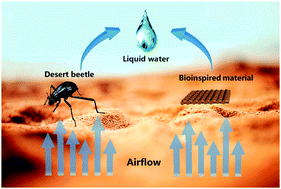Abstract: Nowadays, water shortage is a severe issue all over the world, especially in some arid and undeveloped areas. Interestingly, a variety of natural creatures can collect water from fog, which can provide a source of inspiration to develop novel and functional water-collecting materials. Recently, as an increasingly hot research topic, bioinspired materials with the water collection ability have captured vast scientific attention in both practical applications and fundamental research studies. In this review, we summarize the mechanisms of water collection in various natural creatures and present the fabrications, functions, applications, and new developments of bioinspired materials in recent years. The theoretical basis related to the phenomenon of water collection containing wetting behaviors and water droplet transportations is described in the beginning, i.e., the Young's equation, Wenzel model, Cassie model, surface energy gradient model and Laplace pressure equation. Then, the water collection mechanisms of three typical and widely researched natural animals and plants are discussed and their corresponding bioinspired materials are simultaneously detailed, which are cactus, spider, and desert beetles, respectively. This is followed by introducing another eight animals and plants (butterfly, shore birds, wheat awns, green bristlegrass, the Cotula fallax plant, Namib grass, green tree frogs and Australian desert lizards) that are rarely reported, exhibiting water collection properties or similar water droplet transportation. Finally, conclusions and outlook concerning the future development of bioinspired fog-collecting materials are presented. KeyWords Plus: EFFICIENT FOG COLLECTION; ARTIFICIAL SPIDER SILKS; OPUNTIA-FICUS-INDICA; FRESH-WATER; NAMIB DESERT; SEAWATER DESALINATION; OIL/WATER SEPARATION; SUPERHYDROPHOBIC COATINGS; ENGINEERING MATERIALS; BIOLOGICAL-MATERIALS Published in CHEMICAL COMMUNICATIONS, 52 (20):3863-3879; 10.1039/c5cc09867j 2016
|
